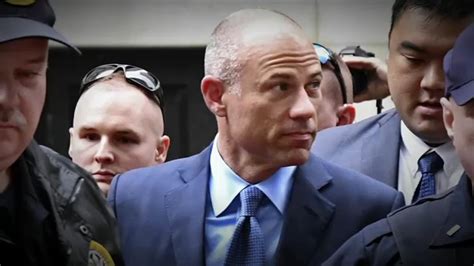
Michael Avenatti, the once high-profile lawyer who rose to fame representing Stormy Daniels, was sentenced Monday to nearly eight additional years in prison for defrauding his former client of hundreds of thousands of dollars. This sentence will run consecutively to the five years he is already serving in a separate New York fraud case, effectively lengthening his total prison time to nearly 13 years.
Former celebrity lawyer Michael Avenatti, already serving a five-year sentence in a New York fraud case, received an additional sentence of seven years and ten months for defrauding Stormy Daniels, his former client, of approximately $300,000. U.S. District Judge Cormac Carney handed down the sentence in a Santa Ana, California, courtroom on Monday, following Avenatti’s conviction on wire fraud and aggravated identity theft charges earlier this year.
The new sentence stems from Avenatti’s representation of Daniels in 2018 in matters related to her allegations of an affair with Donald Trump. Prosecutors argued, and the jury agreed, that Avenatti diverted settlement funds intended for Daniels into accounts he controlled, using the money for his own business expenses and personal use. Avenatti maintained his innocence throughout the trial, claiming he was entitled to the money and that Daniels owed it to him.
“Avenatti was a corrupt lawyer who preyed on his client,” prosecutors stated in court documents, emphasizing the seriousness of his offenses. Judge Carney echoed this sentiment during the sentencing hearing, stating that Avenatti had “abused” his position of trust and exploited Daniels for his own financial gain.
In addition to the prison sentence, Avenatti was ordered to pay Daniels $148,750 in restitution. The judge declined to order the full amount of restitution requested by the government, citing Avenatti’s current financial situation and the unlikelihood of him being able to pay a larger sum.
Avenatti, representing himself at the sentencing hearing, expressed remorse for his actions but continued to argue that his conduct did not constitute fraud. He said he had made mistakes but that his intentions were never malicious. He requested a lighter sentence, arguing that he had already suffered greatly from the public scrutiny and the loss of his career.
The sentencing marks another chapter in the downfall of Avenatti, who was once a prominent figure in the media and a vocal critic of Donald Trump. His legal troubles began in 2019, and he has since been convicted in multiple federal cases.
This California sentence will run consecutively with Avenatti’s five-year sentence in New York, where he was convicted of attempting to extort Nike. The New York case involved Avenatti threatening to release damaging information about Nike unless the company paid him millions of dollars. He was found guilty of extortion and honest services fraud in that case.
The combined sentences effectively mean Avenatti will likely spend nearly 13 years behind bars, significantly diminishing his prospects for returning to public life. His legal woes are not entirely over, however, as he still faces additional charges in California related to alleged tax fraud and bankruptcy fraud.
The Rise and Fall of Michael Avenatti
Michael Avenatti’s rise to prominence was meteoric. He capitalized on his representation of Stormy Daniels to become a frequent guest on cable news, often offering sharp criticisms of then-President Donald Trump. His aggressive style and willingness to take on powerful figures made him a popular figure among Trump’s opponents. He even briefly considered a run for president himself.
However, his legal troubles quickly began to mount. The first major blow came with the Nike extortion case, which exposed a darker side to Avenatti’s public persona. The Daniels fraud case further cemented his image as a lawyer willing to exploit his clients for personal gain.
Avenatti’s downfall has been attributed to a combination of factors, including his own ambition, hubris, and alleged financial mismanagement. He was known for living a lavish lifestyle and racking up significant debts. His legal problems appear to have been fueled, at least in part, by his efforts to maintain this lifestyle.
Details of the Stormy Daniels Fraud Case
The case against Avenatti involved funds from a book deal Daniels negotiated after parting ways with Avenatti. Court documents and trial testimony revealed that Avenatti directed Daniels’ literary agent to send payments to accounts controlled by him rather than to Daniels directly.
Avenatti then allegedly used the funds for various personal and business expenses, including payroll for his law firm and payments on personal debts. He is accused of providing Daniels with false information about the status of the payments, leading her to believe that the money had not yet been received.
Daniels testified during the trial, recounting her shock and anger upon discovering that Avenatti had taken her money. She described feeling betrayed by someone she had trusted to protect her interests.
Impact on Stormy Daniels
The fraud perpetrated by Avenatti had a significant impact on Stormy Daniels. In addition to the financial loss, she suffered emotional distress and a loss of trust in legal professionals. The case also further complicated her already complex legal battles with Donald Trump and his associates.
Daniels has been vocal about her desire to hold Avenatti accountable for his actions. She has expressed satisfaction with the guilty verdict and the sentence imposed by the court. However, she has also acknowledged that the experience has left her with lasting scars.
The Nike Extortion Case
Avenatti’s legal troubles began with the Nike extortion case in New York. Prosecutors alleged that Avenatti attempted to extort millions of dollars from the sports apparel giant by threatening to release damaging information about alleged illegal payments to amateur basketball players.
Avenatti claimed he was acting as a whistleblower, seeking to expose corruption within Nike. However, prosecutors presented evidence showing that he demanded a multi-million dollar payment in exchange for keeping the information private.
A jury found Avenatti guilty of extortion and honest services fraud in that case. He was sentenced to five years in prison, which he is currently serving.
Other Legal Woes
In addition to the Daniels fraud case and the Nike extortion case, Avenatti faces other legal challenges. He is charged in California with tax fraud and bankruptcy fraud related to his law firm and other business ventures. These charges are still pending.
Avenatti has also been involved in a number of civil lawsuits, including claims of unpaid debts and breach of contract. His legal troubles have effectively ended his career as a lawyer and have left him facing significant financial and legal challenges.
Legal Analysis of the Sentencing
The consecutive sentencing of Avenatti in the Daniels fraud case means that he will serve the new sentence after he has completed his sentence in the Nike extortion case. This is a significant outcome, as it effectively increases the total amount of time he will spend in prison.
Judges have broad discretion in sentencing, but they must consider a number of factors, including the severity of the crime, the defendant’s criminal history, and the impact on the victims. In Avenatti’s case, the judge appears to have been influenced by the seriousness of the fraud and the impact on Stormy Daniels.
The fact that Avenatti was a lawyer who abused his position of trust was also likely a factor in the sentencing decision. Lawyers are held to a high ethical standard, and Avenatti’s conduct was seen as a betrayal of that standard.
The relatively low restitution order may reflect the court’s understanding of Avenatti’s financial situation. Ordering a large amount of restitution that the defendant is unlikely to be able to pay can be seen as an empty gesture.
Avenatti’s Defense and Arguments
Throughout his legal battles, Avenatti has maintained his innocence and has argued that he is being unfairly targeted. In the Daniels fraud case, he claimed that he was entitled to the money and that Daniels owed it to him. He also argued that he never intended to defraud Daniels and that any mistakes he made were unintentional.
In the Nike extortion case, Avenatti claimed he was acting as a whistleblower, seeking to expose corruption within the company. He argued that his actions were motivated by a desire to protect the public interest.
These arguments were ultimately rejected by the juries in both cases. Avenatti’s credibility was severely damaged by the evidence presented against him, and he was unable to convince the juries that he was acting in good faith.
Frequently Asked Questions (FAQ)
Q1: What was Michael Avenatti convicted of in the Stormy Daniels case?
A1: Michael Avenatti was convicted of wire fraud and aggravated identity theft for defrauding Stormy Daniels of approximately $300,000 from her book deal proceeds. He directed her literary agent to send payments to accounts he controlled and then used the funds for his own purposes.
Q2: How long is Avenatti’s total prison sentence now?
A2: With the new sentence of seven years and ten months in the Stormy Daniels case, which will run consecutively to his existing five-year sentence for extortion in the Nike case, Avenatti’s total prison sentence is now nearly 13 years.
Q3: What was Avenatti’s defense in the Stormy Daniels case?
A3: Avenatti maintained his innocence, arguing that he was entitled to the money and that Daniels owed it to him. He claimed he never intended to defraud Daniels and that any mistakes were unintentional. He also expressed remorse for his actions at the sentencing hearing but continued to deny fraudulent intent.
Q4: How much restitution was Avenatti ordered to pay Stormy Daniels?
A4: Avenatti was ordered to pay Stormy Daniels $148,750 in restitution. The judge declined to order the full amount requested by the government, citing Avenatti’s current financial situation and the unlikelihood of him being able to pay a larger sum.
Q5: What other legal issues does Avenatti face?
A5: Besides the Daniels fraud and Nike extortion cases, Avenatti also faces charges in California related to alleged tax fraud and bankruptcy fraud connected to his law firm and other business ventures. These charges are still pending. He has also been involved in numerous civil lawsuits.
Detailed Breakdown of the Sentencing Hearing
The sentencing hearing provided a final opportunity for both the prosecution and the defense to present their arguments to Judge Carney. Prosecutors emphasized the gravity of Avenatti’s crimes, highlighting the betrayal of trust and the financial harm inflicted upon Stormy Daniels. They argued that a substantial prison sentence was necessary to punish Avenatti for his conduct and to deter others from engaging in similar behavior.
“Avenatti was a corrupt lawyer who preyed on his client,” prosecutors argued. “He abused his position of trust and exploited Daniels for his own financial gain.”
Avenatti, representing himself, presented a more nuanced picture. While acknowledging that he had made mistakes, he insisted that his intentions were never malicious. He argued that he had worked tirelessly on behalf of Daniels and that he was entitled to compensation for his services.
“I have made mistakes,” Avenatti said. “But I have never intended to defraud Ms. Daniels. I have always acted in her best interests.”
Avenatti also argued that he had already suffered greatly from the public scrutiny and the loss of his career. He pleaded with the judge for leniency, asking for a sentence that would allow him to rebuild his life after serving his time.
Judge Carney listened attentively to both sides before delivering his sentence. He acknowledged Avenatti’s accomplishments as a lawyer but ultimately concluded that his crimes warranted a significant prison term.
“Mr. Avenatti, you have done great things in your life,” Judge Carney said. “But you have also done terrible things. You have abused your position of trust and you have caused great harm to Ms. Daniels.”
Judge Carney’s decision to impose a consecutive sentence underscores the seriousness with which he viewed Avenatti’s conduct. By ordering that the new sentence run consecutively to the existing sentence, he ensured that Avenatti would face a substantial period of incarceration.
The Broader Implications of Avenatti’s Downfall
Avenatti’s downfall has had a number of broader implications. It has served as a cautionary tale for lawyers and other professionals about the dangers of greed and ethical lapses. It has also raised questions about the role of celebrity lawyers in the legal system and the potential for conflicts of interest.
Avenatti’s case has also highlighted the importance of accountability and transparency in the legal profession. Lawyers are entrusted with great power and responsibility, and they must be held accountable when they abuse that power.
Furthermore, Avenatti’s case has served as a reminder that even the most prominent and successful individuals are not immune from the law. No matter how powerful or well-connected someone may be, they will be held responsible for their actions if they violate the law.
The Future for Michael Avenatti
Avenatti’s future remains uncertain. He faces a long prison sentence and significant financial challenges. It is unclear whether he will ever be able to rebuild his career or his reputation.
However, Avenatti is known for his resilience and his determination. He has overcome adversity in the past, and it is possible that he will find a way to do so again.
Whether he is able to successfully rehabilitate himself remains to be seen. But one thing is certain: Avenatti’s case will continue to be studied and debated for years to come. It serves as a reminder of the importance of ethics, integrity, and accountability in the legal profession and in all aspects of life.
The Role of Media in Avenatti’s Rise and Fall
The media played a significant role in both Avenatti’s rise to prominence and his subsequent downfall. His representation of Stormy Daniels thrust him into the national spotlight, and he quickly became a sought-after commentator on cable news.
Avenatti’s aggressive style and his willingness to take on Donald Trump made him a popular figure among Trump’s opponents. He was frequently interviewed on television and quoted in newspapers and magazines.
However, the media’s attention also contributed to Avenatti’s downfall. As his legal troubles began to mount, the media scrutinized his actions and his personal life. The constant coverage of his legal battles damaged his reputation and made it difficult for him to defend himself.
The media’s role in Avenatti’s case raises questions about the responsibility of journalists to report fairly and accurately, even when dealing with controversial figures. It also highlights the potential for the media to both elevate and destroy individuals.
The Impact on the Legal Profession
Avenatti’s case has had a significant impact on the legal profession. It has served as a reminder of the importance of ethical conduct and the potential consequences of violating the rules of professional responsibility.
Many lawyers have expressed dismay and embarrassment over Avenatti’s actions. They have emphasized that his conduct does not reflect the values and principles of the vast majority of lawyers.
Avenatti’s case has also led to calls for greater oversight and regulation of the legal profession. Some have argued that the existing disciplinary mechanisms are not sufficient to deter misconduct.
Whether Avenatti’s case will lead to lasting changes in the legal profession remains to be seen. But it has undoubtedly sparked a debate about ethics, accountability, and the role of lawyers in society.
Avenatti’s Legal Legacy
Michael Avenatti’s legal legacy is complex and controversial. He achieved some notable successes as a lawyer, but his career was ultimately overshadowed by his legal troubles.
He will be remembered for his representation of Stormy Daniels and his vocal opposition to Donald Trump. He will also be remembered for his convictions for fraud and extortion.
Avenatti’s case serves as a cautionary tale about the dangers of ambition, greed, and ethical lapses. It also highlights the importance of accountability and transparency in the legal profession.
His legacy will likely be debated for years to come, but it is clear that he has left an indelible mark on the legal landscape.
The Details of Avenatti’s Financial Misdeeds
Avenatti’s financial misdeeds were at the heart of the charges against him. Prosecutors presented evidence showing that he had diverted millions of dollars from his clients’ settlements into accounts he controlled. He then used the money for his own personal and business expenses.
In the Stormy Daniels case, Avenatti allegedly diverted approximately $300,000 from her book deal proceeds. He directed her literary agent to send the money to accounts he controlled and then used the funds to pay his law firm’s payroll and other expenses.
In the Nike case, Avenatti allegedly attempted to extort millions of dollars from the company by threatening to release damaging information. He demanded that Nike pay him a multi-million dollar “consulting fee” in exchange for keeping the information private.
Prosecutors argued that Avenatti’s financial misdeeds were motivated by greed and a desire to maintain his lavish lifestyle. They presented evidence showing that he had racked up significant debts and was struggling to keep his law firm afloat.
Avenatti’s financial misdeeds ultimately led to his downfall. They damaged his reputation, cost him his career, and landed him in prison.
The Emotional Toll on Stormy Daniels
Stormy Daniels was one of the primary victims of Avenatti’s crimes. She testified during the trial about the emotional toll that his fraud had taken on her.
She described feeling betrayed by someone she had trusted to protect her interests. She said that she had considered Avenatti to be a friend and an ally.
Daniels also testified about the financial hardship that Avenatti’s fraud had caused her. She said that she had relied on the book deal proceeds to pay her bills and support her family.
Avenatti’s actions left Daniels feeling vulnerable and exposed. She said that she had lost trust in lawyers and other professionals.
Daniels has been vocal about her desire to hold Avenatti accountable for his crimes. She has expressed satisfaction with his conviction and his sentence.
The Judge’s Rationale for the Sentence
Judge Carney’s rationale for the sentence was based on a number of factors. He considered the severity of Avenatti’s crimes, his criminal history, and the impact on the victims.
He noted that Avenatti had abused his position of trust as a lawyer and had caused significant financial and emotional harm to Stormy Daniels. He also noted that Avenatti had a history of unethical conduct.
Judge Carney concluded that a substantial prison sentence was necessary to punish Avenatti for his crimes and to deter others from engaging in similar behavior. He also ordered Avenatti to pay restitution to Daniels to compensate her for her financial losses.
The judge’s sentence sends a clear message that lawyers who abuse their position of trust will be held accountable for their actions.
The Public Reaction to the Sentencing
The public reaction to Avenatti’s sentencing has been mixed. Some have expressed satisfaction that he has been held accountable for his crimes. Others have expressed sympathy for him, arguing that he has already suffered greatly.
Some commentators have argued that Avenatti’s case is a symptom of a larger problem in the legal profession. They have called for greater oversight and regulation to prevent similar cases from happening in the future.
Other commentators have argued that Avenatti’s case is an isolated incident and that it should not be used to paint all lawyers in a negative light.
Regardless of their individual opinions, most people agree that Avenatti’s case is a tragedy. It is a reminder that even the most successful and talented individuals can fall victim to greed and ethical lapses.
Avenatti’s Appeal Options
Avenatti has the right to appeal his conviction and his sentence. He can argue that the trial was unfair or that the judge made errors of law.
However, the odds of a successful appeal are low. Appellate courts typically defer to the decisions of trial courts, unless there is a clear showing of error.
If Avenatti’s appeal is unsuccessful, he will be required to serve his prison sentence. He may be eligible for parole after serving a portion of his sentence, but that will depend on his behavior in prison and other factors.
The Long-Term Consequences for Avenatti
The long-term consequences for Avenatti are significant. He has lost his career, his reputation, and his freedom.
He will likely spend many years in prison. When he is released, he will face significant challenges in rebuilding his life.
He may have difficulty finding employment, and he may be ostracized by his former colleagues and friends.
Avenatti’s case is a stark reminder of the devastating consequences of unethical behavior. It serves as a warning to all lawyers and other professionals to uphold the highest standards of integrity.
The Final Word on Michael Avenatti
Michael Avenatti’s story is one of ambition, success, and ultimately, downfall. He rose to prominence as a lawyer representing Stormy Daniels and became a media sensation, but his career was derailed by his own unethical conduct.
He will now spend nearly 13 years in prison for fraud and extortion. His case serves as a cautionary tale about the importance of ethics, integrity, and accountability.
Avenatti’s legacy will be debated for years to come, but it is clear that he has left an indelible mark on the legal landscape. His story is a reminder that even the most talented and successful individuals can fall victim to greed and ethical lapses. It is a lesson that should be heeded by all who aspire to positions of power and influence.









